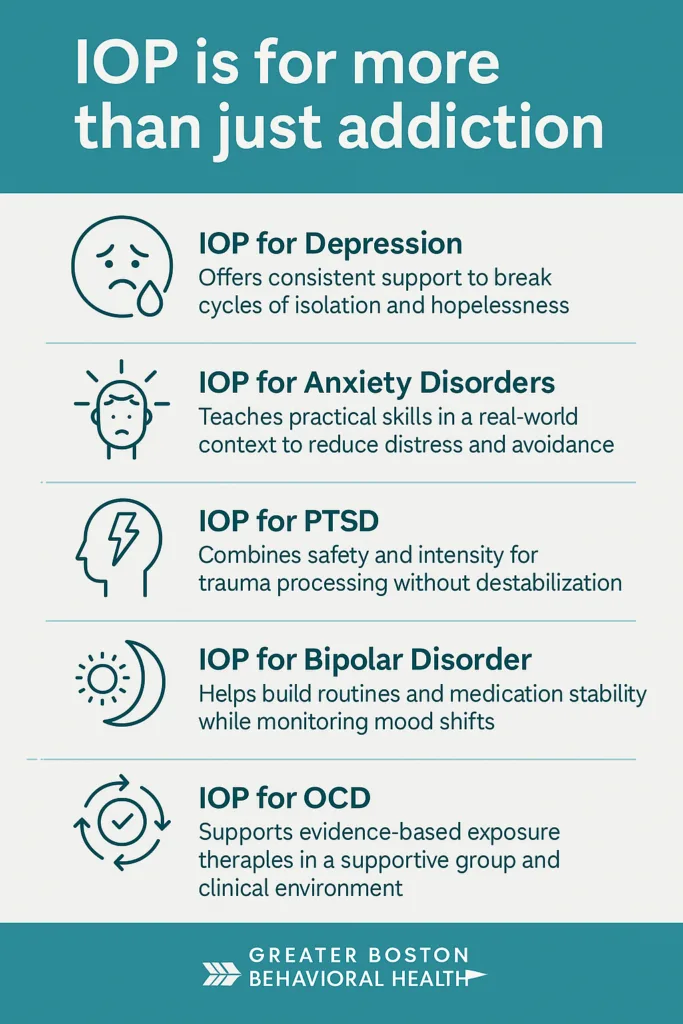When most people hear the term “Intensive Outpatient Program,” they think of addiction recovery. And while that’s one important use, it’s far from the whole story. At Greater Boston Behavioral Health, we use IOP to support people navigating all kinds of mental health challenges—with structure, compassion, and clinically proven care.
If you’ve been recently diagnosed and are wondering what help actually looks like—or if you’re scared of committing to something you don’t fully understand—you’re not alone. Let’s break it down together.
Depression: When “Getting Through the Day” Isn’t Enough
Depression doesn’t just drain your energy—it can convince you that nothing will help. That’s where IOP can shift the equation. You don’t have to wait until you hit a breaking point or need inpatient care.
An IOP creates a rhythm: multiple sessions per week, guided support from therapists, and a group of peers who get it. You learn to spot your patterns, practice healthier responses, and begin to feel like yourself again—even if it’s just in small moments at first.
“I started IOP thinking I’d just sit in the back. But it helped me believe my depression wasn’t permanent.” – IOP Client, 2023
Anxiety: More Than Just Worry
Anxiety isn’t always loud. Sometimes it’s a quiet avoidance—of places, people, conversations. IOP gives that avoidance nowhere to hide. That’s a good thing.
With skilled clinicians and structured support, IOP helps you build tolerance to discomfort, not just manage symptoms. And because it’s outpatient, you get to practice what you’re learning in real time—between sessions, in your real life, right in Boston.
Quick Tools for Managing Daily Anxiety in IOP:
- Grounding exercises
- Thought-challenging techniques
- Exposure activities with clinician support
- Group validation that normalizes your experience
PTSD: Trauma Deserves a Safe, Contained Space
Trauma changes how you move through the world. Trusting a treatment model takes courage—and clarity.
In our Intensive Outpatient Program, PTSD care is trauma-informed from day one. That means we won’t push you to “talk about it” before you’re ready. Instead, we focus on stabilization first, with therapies designed to gently reconnect you to your body, your relationships, and your sense of safety.
And you won’t have to do it alone. Every person in group is there to do the hard work of healing—with boundaries, respect, and support.
Bipolar Disorder: Structure Without Shutdown
When you’re newly diagnosed with bipolar disorder, every decision can feel loaded: Do I need inpatient care? What about medication? How will I keep my job?
IOP offers a middle path. It gives you structured care—consistent therapy, medication management, mood tracking—without stepping away from your life entirely. This can be critical for building sustainable routines and catching red flags early, before they spiral.
It’s not just about crisis response. It’s about creating stability, insight, and community you can return to when things get shaky.
OCD: Exposure Support in a Safe Environment
Obsessive-compulsive disorder thrives on secrecy and ritual. The shame loop can be relentless—and invisible from the outside.
Our Boston-based IOP offers Exposure and Response Prevention (ERP), one of the most effective treatments for OCD. But you won’t be thrown into the deep end. You’ll work with trained clinicians to design exposures that make sense for you, and you’ll do them with guidance and support.
IOP means you get the repetition and intensity these therapies often require—without having to put your whole life on hold.
IOP Isn’t Just for One Kind of Struggle—It’s for Real-Life Healing
At Greater Boston Behavioral Health, we understand that not everyone fits the same mold. Mental health isn’t one-size-fits-all, and neither is treatment.
Whether you’re navigating depression, anxiety, PTSD, bipolar disorder, or OCD, our intensive outpatient program in Boston, MA offers a path forward—with structure, compassion, and a team that sees the whole you.
Ready to take the first step?
Call us at (888) 301-8072. We’ll help you understand your options and figure out if IOP is the right fit. No pressure. Just honest, expert support.
FAQs About Intensive Outpatient Program (IOP)
What is an Intensive Outpatient Program (IOP)?
An IOP is a structured mental health treatment program that provides therapy several times a week, without requiring an overnight stay. It’s a middle level of care—more support than weekly therapy, but less intensive than hospitalization.
Is IOP only for people with addiction?
No. While IOP is often used in addiction treatment, it’s equally effective for mental health conditions like depression, anxiety, PTSD, bipolar disorder, and OCD. At Greater Boston Behavioral Health, we offer IOPs specifically designed for mental health needs.
How long does IOP last?
Most IOPs last 6 to 12 weeks, depending on your needs. You’ll typically attend sessions 3–5 days per week, with both group and individual therapy. Your schedule is designed to fit into real life, not disrupt it.
Will I still be able to work or go to school?
Yes. IOP is designed to support your healing while letting you continue daily responsibilities. Many people attend sessions in the morning or afternoon and maintain part-time work or school schedules.
How do I know if IOP is right for me?
If weekly therapy isn’t enough—but you don’t need 24/7 care—IOP can be a great fit. It’s especially helpful if you’re newly diagnosed, feeling overwhelmed, or need a safe place to stabilize and build new skills. Our team will help you decide what’s best for you.


